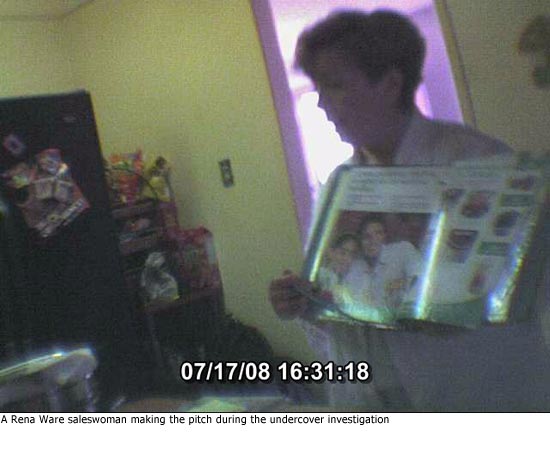Consumer Help
Avoid heartbreak this Valentine’s Day
February 9, 2011
 It’s the season for racing pulses and rising emotions, and the county’s Department of Consumer Affairs wants you to experience those symptoms in only the best of ways.
It’s the season for racing pulses and rising emotions, and the county’s Department of Consumer Affairs wants you to experience those symptoms in only the best of ways.
“But too often, scammers ruin what’s supposed to be a romantic holiday for vulnerable people,” says the department’s acting director Rigo Reyes, who warns that while it’s wonderful to open your heart, you should maintain a close grip on your wallet.
Here’s his department’s advice to consumers who don’t want to be lovelorn this Valentine’s Day:
Don’t click in haste when it comes to Internet matchmakers
Dating web sites are increasingly popular, but Reyes warns consumers to research their dating services and keep a tight rein on their identities. There is little in the law to prevent a service from delivering frogs when they’ve promised princes. “We had one lady, a senior, who ended up paying $35,000 to sign up for a dating service that didn’t pan out,” he says. “We tell consumers to be very careful, especially if you’re being charged large sums of money. California law gives you three days to cancel a contract, but often these companies string people along until the grace period has expired and it’s too late.”
Beware of solicitations from online sweethearts
Often, they’re a tip-off to a common form of fraud. “Generally the way these work is, someone contacts you and you make a connection, and you think you’re hitting it off,” Reyes says. “But then they ask for money, maybe for a plane ticket to come visit you, or they say they’ve had a health emergency and need financial help to get through it.” That kind of mooching isn’t a sign of true love. Once they get your money, they’ll be gone, he warns, “and the victim is left with a broken heart and a broken bank account.”
Don’t be suckered by email requests for your information
Valentine’s Day is a prime time for phishing scams, Reyes says. “The scammer sends you a phony email offering some relationship, or maybe offering to deliver flowers or candy to someone, and then they ask you to complete the transaction by entering your credit card information and personal details,” says Reyes. “Then they steal your identity.” Delete suspicious email. And if someone does manage to steal your identity, contact the Department of Consumer Affairs at (213) 974-9459. Their identity theft experts will help you resolve any charges the thief makes, stop new accounts from being opened in your name and fix your credit report, for free.
Don’t open e-valentines from strangers
Sad, isn’t it? But one of the more common scams involves booby-trapping electronic greeting cards with spyware and viruses. “You open the card, and it asks you to click on something inside, and then that sends you to a site that often asks you to download software,” says Reyes. Often the name sounds like a legitimate web site. “We had one where consumers were sent to something called ‘American Greetings’ or something,” says Reyes. “But all they’re doing while you click is installing something on your computer that’s going to cause you trouble later.” Fortunately, there are ways to thwart e-scammers. For a primer from Consumer Reports, click here.
Shop around if you’re planning to give jewelry and get an appraisal
Valentine’s Day is a big season for gold and diamonds, and Reyes says that every year, his department hears from consumers who were overcharged either in person or online for carats and quality. “It’s very difficult for consumers to resolve these complaints because the receipts often don’t reflect what they were verbally told by the salespeople,” says Reyes. So take time to do your homework, and consult an independent appraiser. “If you’re buying a $5,000 diamond, it’s good to invest a couple hundred bucks up front to make sure you get what you pay for, especially online.”
And if you find true love after all, the county can help you say, “I do”
Of course, some days are simply meant for romance. And if you manage to navigate the pitfalls, the county will be happy to help happy couples get hitched for Valentine’s Day. The Registrar-Recorder/County Clerk’s office will be issuing marriage licenses and performing same-day ceremonies on February 14 at its seven offices conveniently located around the county, no appointment necessary. (Added bonus: You’ll never forget your anniversary.) Click here for more details.
Posted 2/9/11
Book ‘em (online) Danno
September 28, 2010
Want to reserve a kayak at Castaic Lake or an RV hookup at Dockweiler Beach?
Starting this week, you can—with a click of the mouse.
A new online reservation system for selected county parks just went live, allowing residents to book—and make credit card payments for—a wide range of activities at selected parks and recreation areas, including picnic areas, swim lessons, and campsites and RV spots.
The reservations site starts with five facilities: Dockweiler Beach, Castaic Lake State Recreation Area, Arcadia County Park, Alondra Park in Lawndale and Charles S. Farnsworth Park in Altadena.
New facilities will be added over the next six months.
Using the new system, the public can track availability, book a reservation and pay by credit card. Booking availabilities at the various parks include basketball courts, picnic areas, meeting rooms, and even a space at Arcadia Park specifically suited for a dog show.
The new program has a simple-to-navigate site along with a lengthy name, the Los Angeles County Activity Registration and Reservation System, or LACARRS. It was developed jointly by the county Parks and Recreation, Beaches & Harbors and Internal Services Departments and the Chief Information Office.
Posted 9/28/10
L.A. County property values take deep slide
August 26, 2010
 Total property values in Los Angeles County sunk last year by the sharpest margin since 1995, during the depths of the last housing recession.
Total property values in Los Angeles County sunk last year by the sharpest margin since 1995, during the depths of the last housing recession.
The property rolls in the county fell $18.5 billion, to a total of $1.089 trillion—a 1.7 percent decline from 2009.
The valuations are disclosed in the L.A. County Assessor’s newly-released 2010 Annual Report. The yearly snapshot of 2.3 million residential and commercial properties details changes in value in all of the county’s 88 cities and unincorporated areas, providing residents with a guide to property trends in their communities.
Assessor Robert Quon attributed the drop chiefly to the housing malaise.
“The largest factor was the continuing decline in home values,” said Quon, who was appointed as assessor on April 1, after 39 years in the department, to replace the retiring Rick Auerbach. Quon is not running for the post in the November election.
But also contributing to this year’s decline was a rare occurrence: no inflation.
In previous years, rising inflation has meant higher valuations, which are allowed under Proposition 13, so long as they don’t exceed 2 percent. This year, inflation actually fell by .3 percent, Quon said. The result: $2 billion less on the assessment rolls. “This is the first year that [the inflation factor] has been negative,” Quon said.
In preparing this year’s report, Quon said his office focused on areas hit hard by the housing bubble-and-bust, reviewing the values of 583,000 homes and condominiums, most of which were purchased between 2003 and 2009,
Of those, about 400,000 had declined in value. The average single family home plunged by $162,000, while condos fell by $133,000. The good news was that the lowered assessments brought a reduction in property tax bills for those condo and home owners of between $1,500 and $1,800, respectively.
The outlook for local government, however, is not so good.
The reduced revenues in cities that saw values decline will mean a drop in funding for schools and public services that depend on property taxes, Quon said.
“If there is a reduction in value that is warranted, we go out and reduce those values, regardless of what it means for government revenue,” Quon said. “We are trying to be accurate” to be certain no property owners aren’t charged more than their fair tax burden.
Overall, property values fell in 61 of the county’s 88 cities and in unincorporated county areas. Los Angeles fell 2.3 percent; Long Beach slumped 2.9 percent; Beverly Hills lost 2.6 percent and Santa Monica edged down 0.9 percent.
The steepest declines were in the Antelope Valley; Palmdale fell by 12 percent, while assessed values in Lancaster shrank by 14.4 percent
The unincorporated areas, listed in a single category and not broken down by location, saw a 2.6 percent decline.
Meanwhile, values rose or held steady in 27 cities. In addition to county-leading Arcadia (up 4.4 percent), Hidden Hills rose 2.0 percent, Glendale rose 1.3 percent and Malibu climbed 1.2 percent.
Despite the drops, Quon says the county’s property tax base remains “strong.” It’s the third highest total on record—topped only by 2008 and 2009. He said the county hasn’t suffered as much as neighboring counties that have been hit even harder by the housing crunch.
Also, in another bit of encouraging news, Quon said property foreclosures in Los Angeles County in 2009 dropped to 36,500 from 41,300 in 2008.
Posted 8/26/10
Who’s making what?
August 26, 2010
 Starting this week, the salaries of roughly three dozen Los Angeles County executives who head agencies as obscure as the office of Military and Veterans Affairs and as massive as the Department of Public Social Services can be viewed online for the first time.
Starting this week, the salaries of roughly three dozen Los Angeles County executives who head agencies as obscure as the office of Military and Veterans Affairs and as massive as the Department of Public Social Services can be viewed online for the first time.
The action came after the Board of Supervisors two weeks ago unanimously approved a motion by Supervisor Zev Yaroslavsky aimed at increasing transparency in the wake of the city of Bell salary scandal. The salaries of the county’s elected officials have long been a matter of public record, as have salary ranges for all job classifications within the bureaucracy. (Members of the Board of Supervisors make $178,789 a year.)
Topping the newly posted list of board-appointed officials is Chief Executive Officer William T Fujioka, with an annual salary of $338,458. He’s followed by the director of the Department of Public Health, Dr. Jonathan Fielding, whose annual salary is $309.494.
The complete list can be seen here and accessed through county’s main website.
Posted 8/25/10
More scrutiny for public paychecks
August 3, 2010
 Continuing revelations about salary and pension abuses in the city of Bell have stoked popular outrage and served as a wake-up call for elected officials up and down the state.
Continuing revelations about salary and pension abuses in the city of Bell have stoked popular outrage and served as a wake-up call for elected officials up and down the state.
But while Bell officials have largely stonewalled the press and public in releasing key information, the county of Los Angeles has long posted elected officials’ salary and tenure information, as well as a payroll list of all County employee job classifications and salary ranges. However, with department head compensation listed only by salary schedule code—not by name—the public can’t readily determine exactly what they’re paying those top executives.
To shed some light on the issue, Supervisor Zev Yaroslavsky has authored a motion to be placed on the Board of Supervisors’ agenda for August 10. The motion would require that within two weeks the county’s Chief Executive Officer and Auditor-Controller compile, post online and regularly update detailed salary information for all county department heads by name, similar to the posting for the county elected officials.
Meantime, State Controller John Chiang has announced that he will begin collecting and posting detailed local government salary information for the state’s 58 counties and 480 incorporated municipalities.
Posted 8/3/10
Rattling those shady pots & pans sales
July 22, 2010
It was time to blow the lid off the scam.
After receiving numerous complaints, investigators with the county’s Department of Consumer Affairs decided to go undercover to prove that agents of a direct-sales cookware company were making outlandish claims about their expensive pots and pans. Among those claims: that the company’s cookware could help prevent cancer, diabetes and Alzheimer’s.
Posing as potential customers, the investigators secretly videotaped agents for Rena Ware International Inc. employing high-pressure scare tactics, claiming that people might get sick unless they bought kitchenware sets costing from $1,000 to $4,000.
“The saddest thing is that the customers were mostly low income people, and many of them took on huge debt,” said Rigo Reyes, the department’s acting director who took part in the undercover operation.
The Rena Ware investigation, conducted with the state’s attorney general and the Los Angeles County district attorney, led to a civil suit against the company that was settled earlier this month. The Redmond, Wash.-based company admitted no wrongdoing but agreed to pay $625,000 in penalties, costs and fees, including $250,000 in consumer refunds and $100,000 to hire an independent monitor for a year.
“Their illegal high pressure sales tactics preyed on the fears of vulnerable Californians,” Attorney General Jerry Brown, the Democratic candidate for governor, said in a statement.
In a statement after the settlement was announced, Rena Ware said it had cooperated fully with the investigation and promised to “remain vigilant against fraudulent and unethical sales tactics.”
The undercover job was one of a half-dozen that Consumer Affairs investigators undertake each year, usually targeting auto dealerships or immigration consultants. More often, the department’s 15 investigators attempt to resolve consumer complaints about landlords, small businesses, real estate-related scams, identity theft and elder abuse. They sometimes refer cases to the Los Angeles city attorney, the district attorney or, when they include complaints from other counties, the attorney general.
Rena Ware International, a privately-held direct sales firm, sells cookware and water purifiers in the U.S., Europe, Asia and Latin America through an independent sales force it trains and supplies. In California, where the company is popular in the Latino community, the undercover meetings were conducted in a mix of English and Spanish.
“Consumer Affairs’ work was critical in this case,” said Michele Van Gelderen, the state deputy attorney general who prosecuted the case. “Their investigation obtained first-hand evidence of the wrongdoing, coupled with extensive consumer interviews that showed the practices were widespread.”
The Rena Ware investigation started in mid 2008, after an executive in a rival company, which was being investigated by Consumer Affairs, complained that his firm was being unfairly targeted.
“He said there were companies that were worse than his, and I asked which one,” Reyes recalled. “He said Rena Ware.”
In response, Consumer Affairs re-interviewed people who had complained about Rena Ware in recent years and were told that the company’s agents scared consumers into thinking that other companies’ pots and pans were full of dangerous contaminants. For example, the sales people allegedly claimed that Teflon coatings were made of recycled tires and could cause cancer.
The sales force claimed that Rena Ware’s stainless steel cookware helped ward off diseases because it was made of “the same material doctors used to perform surgery,” Reyes said. They also contended that the pans could remove harmful hormones from chicken.
Reyes’ undercover team set up meetings in July 2008 with three Rena Ware sales teams to find out whether such unproven claims were widespread.
“Companies always say the sales people are independent and it has no control over them,” Reyes explained. “We wanted to show that it’s a company problem.”
Using an investigator’s home in Maywood, Reyes and investigator Maggie Becerra pretended to be husband and wife while other investigators played the roles of friends or relatives. Hidden cameras recorded the action.
The meeting sequences were remarkably similar. The Rena Ware sales teams, often husbands and wives, always conducted a “demonstration” by preparing a meal that quickly turned into a sales pitch.
At the first meeting, Reyes and Becerra agreed to pay $2,136 for cookware and a countertop electric stove, supposedly for Becerra’s diabetic mother. At a meeting with another sales team, Reyes bought a 17 piece set for $2,238, ostensibly for his elderly grandmother.
At the first meeting, Reyes and Becerra repeatedly asked about the company’s interest rates.
“They kept saying it was 2%,” Reyes recalls, but failed to say that figure actually was the monthly rate. The annual rate was a steep 21.5%, adding hundreds of dollars to the purchase price.
During the second meeting, the sales woman offered to help Reyes obtain illegal identification after he said he wouldn’t qualify for Rena financing because he was in the U.S. illegally.
According to Reyes, the saleswoman first suggested that he could use a friend or relative’s social security number. When he declined, “she said she could take me to a place in L.A. where I could buy a whole package of false ID,” recalled Reyes, who declined that offer, too. Investigators concluded that identify-fraud proposal was the woman’s own idea and not company-wide practice.
Reyes said that he understands how powerful the appeal to health and family can be; he said his own uncle bought Rena Ware some years back. But, he said, consumers need to be more skeptical.
“If some guy says this will cure cancer, that it’s a miracle pot, you can’t just believe it,” Reyes said. “Consumers need to learn how to say no.”
Posted 7/22/10
Avoid the banquet hall blues
June 9, 2010
Let the party begin—or not.
Every June, hundreds of banquet halls across Los Angeles County are booked with weddings, proms and other celebrations. But it’s also the biggest month for complaints from “angry and desperate” people who discover at the last minute that their joyous celebration has turned into a banquet-hall bust, says Rigo Reyes, acting director of the county’s Department of Consumer Affairs.
Unscrupulous and/or financially shaky banquet hall operators have been known to collect thousands of dollars and then fail to deliver. Although complaints are heaviest during the wedding season, rip-offs occur year round for families planning everything from bar mitzvahs to quinceaneras.
The most common complaint involves banquet halls that have been paid but go out of business before party time. “The families drive by, and the place is abandoned,” Reyes says.
Other problems include switching locations from an attractive hall to an inferior one, or substituting cheaper food, drinks, decor or flowers for the ones promised. “If you find out at the last minute,” Rigo says, “you don’t have any leverage.” To prevent disaster or disappointment, Reyes and his department offer some simple tips:
- Patronize only stable banquet halls with long track records. Research them for complaints.
- Insist on a written contract that states the correct time, place and services for your event.
- Pay with a credit card so you can dispute charges if trouble arises.
- Make the initial deposit small and pay the balance close to the big day.
- Check back with the hall regularly to make sure everything’s on track.
If things do go wrong, contact the Consumer Affairs Department or file a complaint form.
Finally, Reyes suggests that another way to protect against fly-by-night banquet halls is to hold the event at public facilities, such as county parks that routinely host wedding and other celebrations. As Reyes, who got married at a small park in Berkeley, says: “You know it’ll be there when you need it.”
Posted 6/9/10
Property tax to fall for many county homeowners
June 4, 2010
A new round of property-tax notices are heading to some Los Angeles County homeowners later this month, and the result will be a smaller tax bite for more than 400,000 local home and condo owners.
Los Angeles County Assessor Robert Quon announced this week that his office has reassessed the values of all 560,000 single-family homes and condos bought in the county between the summers of 2003 and 2009. The survey also included some home sold in earlier years in areas hit hard by the housing crisis.
The bad news: values dropped on more than 70 percent of the residences. The average plunge was $162,000 for homes and $133,000 for condos.
The silver lining for those property owners: falling prices will mean an average 2010 tax savings of between $1,500 and $1,800.
Notices of the reassessments should land in mailboxes by the end of June. The actual property tax bills will be issued in October. Householders who disagree with the Assessor’s finding—whether part of the reassessment or not—can file a free Decline-in-Value application by November 30, either by calling 888-807-2111 or filling out the form at the Assessors’ website, here.
Posted 6/4/10
Consumer alert: avoid grant-deed mailers
May 17, 2010
 There’s no good deed in this offer.
There’s no good deed in this offer.
Consumer affairs officials are warning homeowners to steer clear of direct-mail pitches that urge them to quickly order copies of their grant deeds to help prevent potential foreclosure. The cost: a hefty “processing fee” of $157 for a document that can be obtained directly for as little as $6.
These “Title Compliance” firms, exploiting foreclosure fears, suggest in the mailing that homes may be in jeopardy unless the owners obtain copies of their deeds by a certain deadline.
At the top of one of the mailers is the official-sounding heading: “Notice for Los Angeles County Property Owners.” It states that it is being sent by the “Records Retrieval Division.” Only in the fine print does the document disclose that it is coming from a private, “non-governmental company.”
“It’s very deceptive and misleading,” says Rigo Reyes, the Consumer Affairs Department’s acting director. Reyes says that having a copy of your grant deed does not protect you against foreclosure, which is usually the result of delinquent mortgage payments.
Those who don’t have a copy of their deed—and they are useful against certain forms of housing fraud—can easily order one from the county Registrar-Recorder/County Clerk. The cost is $6 for the first page and $3 for each additional page.
Last year, Consumer Affairs cracked down on scammers who also were using official-looking mailings to entice homeowners into paying excessive amounts for requests to have their homes reassessed for lower property taxes. In those cases, the companies were charging as much as $200 for a service performed by the Assessor’s Office for free.
The current mailings have been received in homes across the county this spring, in both Spanish and English. Reyes says that Consumers Affairs, which has made it “a high priority” to warn consumers, has logged 43 complaints, from Palmdale to Mandeville Canyon, with more expected.
To report a problem, or seek more information, visit the Consumer Affairs website or call 800-593-8222.
Posted 5/17/10















 405 bridge work causes a stink
405 bridge work causes a stink
